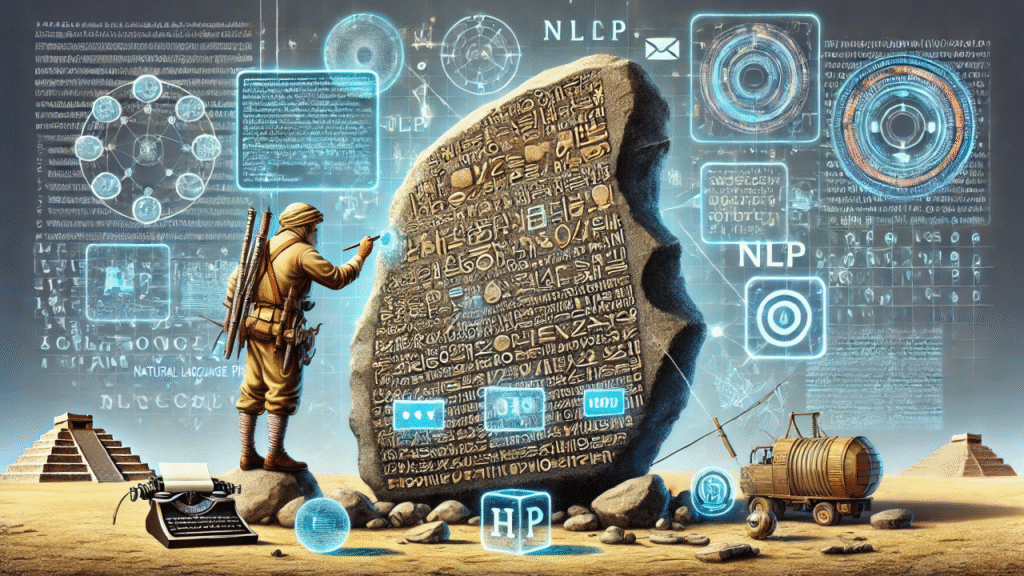Artificial Intelligence (AI) has profoundly transformed various sectors, from healthcare to business, and at the heart of this transformation lies Natural Language Processing (NLP). Just as the Rosetta Stone allowed us to decipher hieroglyphs and unravel ancient languages, NLP acts as a bridge between human language and computational understanding, becoming essential for AI advancement.
NLP as AI’s Rosetta Stone
The Rosetta Stone was crucial for understanding ancient Egyptian writings, thanks to the same message written in three different languages. Similarly, NLP allows machines to interpret, understand, and respond to human language in its multiple forms and nuances. It decodes the complexity of human communication, enabling AI systems to interact more naturally and effectively with users.
NLP faces challenges such as semantic ambiguity, cultural context, and linguistic variations—elements intrinsic to human communication. By deciphering these elements, NLP allows AI to understand not only the literal meaning of words but also the intention behind them, making human-machine interaction more fluid and intuitive.
NLP’s Advantage in Generative AI
Generative AI, especially advanced language models like Large Language Models (LLMs), heavily depends on NLP to generate coherent and relevant content. NLP provides the necessary tools for these models to understand language structure and produce responses that mimic human communication.
NLP’s advantage in Generative AI application lies in its ability to analyze large volumes of textual data, identify linguistic and semantic patterns, and apply this knowledge to generate new information. This results in systems capable of producing texts, translating languages, summarizing documents, and even creating creative content like poems and stories with a high degree of sophistication.
The Importance of NLP in Using Thematic LLMs for Knowledge Management
In the information age, Knowledge Management has become fundamental for organizations seeking to maximize their intellectual resources. Thematic LLMs, trained on domain-specific datasets, emerge as powerful tools for this purpose. NLP plays a crucial role in this context, allowing LLMs to understand and process specialized language, technical terms, and industry-specific jargon.
What Are Thematic LLMs?
Simply put, they are AI models trained on large volumes of data specific to a particular theme or area. This means they “understand” deeply about that subject. Think of them as specialized assistants that can help you find precise answers, raise new questions, and even propose innovative solutions.
By applying NLP to thematic LLMs, organizations can:
Capture and Organize Knowledge: Extract valuable information from large volumes of documents, reports, and internal communications, structuring knowledge in an accessible manner.
Facilitate Knowledge Transfer: Help new employees integrate quickly by providing intuitive access to relevant information.
Support Decision Making: Provide insights based on data and updated information, helping managers make informed decisions.
Promote Innovation: Identify trends, patterns, and opportunities hidden in vast datasets, stimulating innovation within the organization.
NLP allows thematic LLMs to interpret specific nuances and contexts, ensuring that the responses and information provided are accurate and relevant to the domain in question.
Impact and Future of NLP in AI and Knowledge Management
The advancement of NLP has a significant impact on how we interact with technology and manage knowledge. Specialized virtual assistants, intelligent search systems, and text analysis tools are revolutionizing how we access and use information.
In the future, NLP is expected to continue evolving, enabling even more natural and personalized interactions. With the development of more advanced models and the integration of multidisciplinary knowledge, AI will be able to understand not only language but also human emotions and intentions more deeply.
Conclusion
Natural Language Processing is undoubtedly the Rosetta Stone of modern Artificial Intelligence. Its ability to decipher and interpret the complexity of human language is fundamental to the advancement of Generative AI and the effective use of thematic LLMs in Knowledge Management. As we continue to explore NLP possibilities, we approach a future where interaction between humans and machines will be increasingly harmonious and meaningful, and where knowledge can be managed and disseminated with unprecedented efficiency.
Note: The text of this newsletter was developed as collaborative work and idea exchange, after many reflections with the new ChatGPT o.1 (Strawberry) model.

